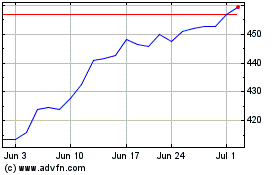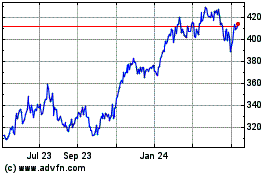EU Plans New Legislation to Protect Publishers
August 31 2016 - 8:40AM
Dow Jones News
BRUSSELS—The European Union's executive branch will propose
formal legislation that would help publishers seek remuneration
from news aggregators such as Alphabet Inc.'s Google news search
that list snippets of articles on their website, according to
internal documents seen by The Wall Street Journal.
In a draft document outlining its legislative proposals to
update the bloc's copyright rules, which is expected to be formally
announced in late September, the European Commission said the new
EU-wide rules would hand news publishers "legal certainty and
bargaining power" against online services using their content.
A draft version of the legislative proposal requires member
states to grant publishers additional rights over the online use of
their articles, which would last for 20 years after publication of
the articles.
"It is necessary to provide a harmonized legal protection for
news publications in respect of online uses within the European
Union," the draft proposal says. "Such protection can be
effectively guaranteed through the introduction, in Union law, of
rights related to copyright for the reproduction and making
available to the public of news publications in respect of online
uses."
The EU's 28 commissioners still need to formally sign off on the
proposal before it becomes official.
The legislative outline follows an internal assessment that set
out the commission's preferred policy options, which included
encouraging national governments to draw up legislation that would
require news aggregators and social media companies to pay
publishers for using their content when publishers seek
compensation.
That initial assessment, however, didn't explicitly state that
the commission would propose new legislation on the matter.
The copyright proposal is in the form of a directive, meaning
that member states decide how to implement the EU rules. This means
the countries can also determine sanctions for companies failing to
comply.
But similar initiatives in Spain and Germany have failed to halt
further financial erosion for publishers. Google shut down its news
service in Spain while publishers in Germany eventually granted
Google a free license to publish its content after traffic from the
search engine sank.
Once it makes the formal announcement about the new copyright
legislation, the commission's proposals would then be debated by
the European Parliament and member states, where they will likely
be amended before entering into law.
Member states will then have 12 months to transpose the rules
into their national laws, according to the draft proposal.
The commission's move is part of a broader initiative to level
the regulatory playing field between newer internet companies and
more traditional industries.
Earlier this year the EU said it scrapped previous plans to
regulate an array of web companies from different industries—be it
search engines, social-media platforms, chauffeuring or financial
services—under one sweeping piece of legislation. Instead, it said
it would deal with any problems arising from disruption by web
platforms in its various proposals, including in new copyright and
telecoms rules.
According to a separate internal document about upcoming
telecoms proposals, the commission is set to propose more rules for
so-called over-the-top telecommunications services such as
Microsoft Corp.'s Skype or Facebook Inc.'s WhatsApp, in a bid to
help the bloc's big telecom operators better compete.
News Corp, publisher of The Wall Street Journal, earlier this
year filed an official complaint to the European Commission over
Google's practices with its news search service.
News Corp claims that Google reinforces its dominance in general
search by refusing to show articles at all if the publisher doesn't
consent to Google's habit of "scraping" or copying content from
publishers to display the results of news articles.
Write to Natalia Drozdiak at natalia.drozdiak@wsj.com
(END) Dow Jones Newswires
August 31, 2016 08:25 ET (12:25 GMT)
Copyright (c) 2016 Dow Jones & Company, Inc.
Microsoft (NASDAQ:MSFT)
Historical Stock Chart
From Mar 2024 to Apr 2024

Microsoft (NASDAQ:MSFT)
Historical Stock Chart
From Apr 2023 to Apr 2024
